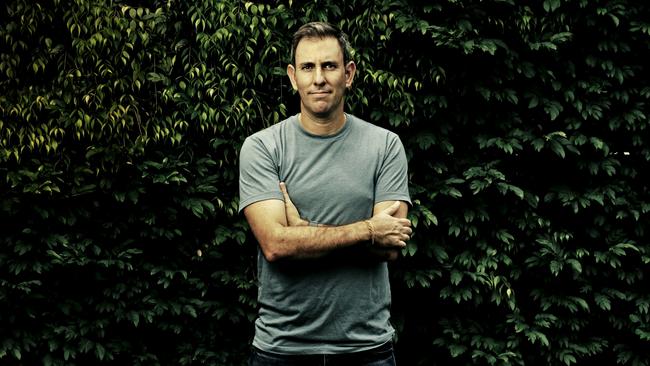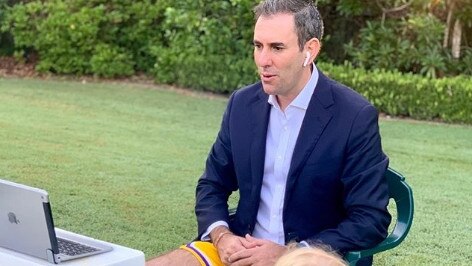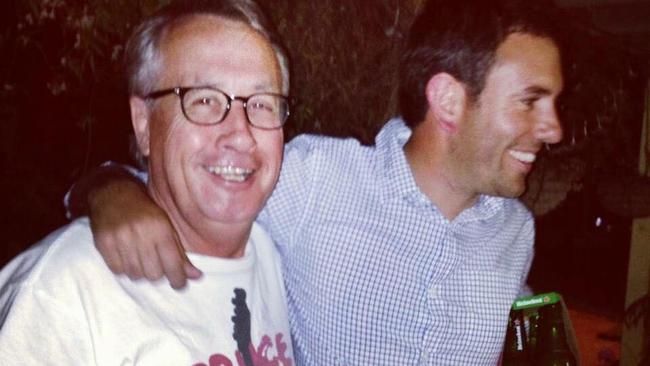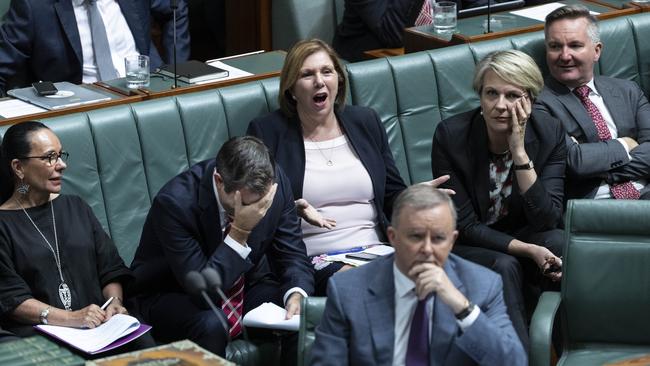Jim Chalmers takes the long run to Labor leadership
He chose not to contest the Labor leadership after the party’s shock election defeat. What is Jim Chalmers up to?

When he wants to get away from the colleagues, media and the expectations that get pinned on a youthful-looking father of three who is seen as the next big thing in the Labor Party, Jim Chalmers slips the phone into his pocket and disappears into Daisy Hill Conservation Park. He calls it his safe place. He runs and runs in the Brisbane sunshine until his head is clear.
Every momentous decision of his adult life has been made there, amid the hum of cicadas and distant drone of traffic from the M1 freeway. To join the ALP and go for a federal seat; to seek the hand of the woman he loves; to reject all the precepts about how politics is supposed to be practised, that it’s now or never mate, but maybe hold back when the prize of the party leadership glittered.
As Labor’s treasury spokesman, Chalmers stands high in the pecking order behind Anthony Albanese, maybe even next in line were the leader to falter. It’s a heady climb for an MP who has been in the parliament barely seven years, but not such a leap for the hardened operative who spent most of the Rudd-Gillard-Rudd years as a trusted adviser to Wayne Swan, treasurer to both warring prime ministers. To friend and foe alike, he is a man to watch.
You might have noticed him during the federal election campaign last year when the ALP was supposed to be a shoo-in to win and Chalmers, 42, was its fresh-faced campaign spokesman. Covid-19 makes it seem long ago. He’s been front and centre of the Opposition’s bid to stay relevant during the pandemic and check the one snapback it didn’t want: that of Scott Morrison from his summer horribilis.
Chalmers’ energy, patience and commitment will be central as the nation comes out of its enforced hibernation and Labor takes up the fight to a PM now riding high in the polls alongside Treasurer Josh Frydenberg, that other coming man in Canberra. It’s early days in what shapes as a marathon slog to the next election. Chalmers must tread carefully, not least with the colleagues who track every word he utters, every move he makes. He needs to shine in parliament – what there is of it – and in the media to demonstrate he can handle the second-toughest job in opposition, just not too brightly lest it show up Albanese and invite questions about his own undeniable ambition. You can bet his participation in this profile will set tongues wagging in the Labor caucus.
Chalmers knows the game, the snakes and ladders of Australian politics, and tries to keep the ups and downs in perspective. The airy brick bungalow he shares with his journalist wife, Laura, and their young children is within jogging distance of his cherished park, framed by streets peppered with the friends he grew up with. Another thing to understand about him is that he professes to have found “place before politics”.
“It’s flattering from time to time that people say nice things about your future,” he says. “But it’s not something I sit around thinking about a lot… I’ve always had my eye on treasury, because I know a fair bit about the role… and I can see the potential of it. I genuinely want to do a great job for Anthony and the team. One of the good things about the aftermath of the election is that we all had our say, we all had our opportunity to put our hand up, or not put our hand up, and I’m really comfortable with how things played out. I made the right decision for the right reasons.”

He was in the park, of course, on the Sunday morning after the shattering night of May 18, 2019, the phone in his gym shorts chirping like a songbird. They were all calling: Bill Shorten, having announced he would not stay on as leader; Albo confirming he would go for it; Shorten’s deputy Tanya Plibersek, who was initially minded to run but in the end would bow out; shadow treasurer Chris Bowen, with whom Chalmers had worked closely in his role as finance spokesman heading into the campaign, toing and froing about joining the race, which he belatedly would.
Chalmers was being urged to stand, by senior figures in the Labor Right. MP Milton Dick from the seat adjoining Chalmers’ outer suburban electorate of Rankin and frontbencher Shayne Neumann in nearby Blair went public along with Queensland senator Anthony Chisholm, his oldest friend in politics, arguing the need for a Queensland presence in the leadership group after Labor had won just six of the state’s 30 federal seats at the election. Ranking figures in the Victorian Right were just as insistent that he run. He was non-committal at that point, unsure whether another hat in the ring would do anyone any good. Weeks earlier, on the Monday after the election, he’d appeared on the ABC-TV show Q&A; anticipating a Labor victory and, no doubt, juicy recriminations on the blue side, the panel included outgoing Liberal minister Christopher Pyne and radio broadcaster Alan Jones. Instead, the pile-on was on Chalmers, who revealed he was “considering” a tilt at the leadership.
His reasons for subsequently dropping out of the race for both leader and deputy have been the subject of intense speculation in ALP circles. He won’t go into what was discussed behind the scenes or the permutations – those snakes and ladders again – of who might have featured on one prospective ticket or another. But he says reports that he was leant on to stand aside after Plibersek and then Bowen withdrew are “complete bullshit”, explaining: “It wasn’t like that … the most pressure I came under was to run.”
So why didn’t he? The uncharitable view is that he knew he didn’t have a chance. Maritime union boss Paddy Crumlin dismissed him as “another blow-in”, saying he lacked the profile or standing to lead the party. However, those privy to Chalmers’ prospective numbers say his caucus vote would have been in the mid-40s, neck and neck with Albanese. Given that the Labor rank-and-file also has a 50 per cent say in any leadership ballot and Albanese had cleaned up there when he went up against Shorten in 2013, the expectation is Chalmers would have lost. “There was a chance I could win, but I wasn’t certain,” Chalmers says. “I wasn’t expecting to have to make a decision like that so early on. A lot of people said run, and get in the queue; others made the ‘now or never’ kind of argument. But if you have doubts, you probably shouldn’t run. I didn’t want to waste anyone’s time.”
Personal considerations were equally important. Laura, 37, was about to return from maternity leave to start a job editing a lifestyle magazine, and juggling with him the care of baby Jack, Annabel, three, and Leo, five. Between parliamentary sittings and the engagements that normally choked his diary, Chalmers averaged three days a week away pre-Covid; had he become leader, it would have been more like six, a big ask of his family.
His mother Carol, 68, lives three minutes’ away in the weatherboard highset that was home in the 1980s to Chalmers and his older sisters, Chelley and Jenni. Political discussions around the dinner table did not figure in his upbringing: their father, Graham, drove a courier van and gave every impression that he leaned conservative, Chalmers says. Carol, a nurse who worked night shifts for most of his teenage years, didn’t vote Labor until her son started to climb the ladder as a political adviser. His sisters had moved out of home by the time their parents split. Young Jim was 14; he took it hard.
He’d done well at the Catholic schools Graham insisted on; then he began playing up in class and his grades slipped. He credits his modern history teacher, a refugee from post-war Germany named Norbert Greulich, for putting him back on track and firing his interest in politics. They are still in touch. Greulich, 85, was the first of the strong male mentors who helped shape the man. “He was always going to go into politics,” the retired teacher says.
By the time Chalmers landed a job as an adviser to Swan in 2004 he had a PhD in political science from the Australian National University – his doctoral thesis was a study of Paul Keating’s prime ministership entitled Brawler Statesman – as well as hands-on experience in Queensland’s Department of Premier and Cabinet and managing the ALP national secretariat’s research program in Canberra. Within a year, aged 27, he was deputy chief of staff to Labor leader Kim Beazley.
His education in the political dark arts was rounded off when Kevin Rudd clinched a leadership ticket with Julia Gillard and toppled the affable Beazley, a portent of what was to come. Labor won big under Kevin ’07 and then tore itself apart in office. As principal adviser and ultimately chief of staff to treasurer Swan, Chalmers was in the vortex of the 2008-09 global financial crisis and its testing aftermath. It still rankles Chalmers that the feat of fending off a recession was overshadowed by Gillard’s knifing of Rudd in 2010, Labor’s near-death experience at that year’s election, Rudd’s revenge strike against Gillard in 2013 and heavy defeat to Tony Abbott in the polls soon after.
The madness of it all played out in the most unexpected places.

You couldn’t ask for a more elegant setting for awedding than Gurragawee, a homestead outside Byron Bay shaded by deep verandas and lofty Norfolk pines. A who’s who of the Labor Party and Canberra press gallery had gathered to celebrate with Chalmers and his bride on March 23, 2013. Hailing from Adelaide, Laura had been The Advertiser’s woman in Canberra until she was recruited by Labor minister Penny Wong and in turn Gillard. After mulling it over in the conservation park, Chalmers proposed in 2012; within months, he’d made good on another life-changing decision to leave Swan’s office. He was tired, heartily sick of the grind and unhealthy, having packed on 16kg. Following the 2010 election, he’d been urged to become ALP national secretary, in charge of federal election campaigning. But he had his eye on another prize, Rankin, held by Gillard loyalist Craig Emerson. He resolved to get married, get fit, and bide his time while managing the Chifley Research Centre, an ALP think tank, from Brisbane. But two days out from the wedding, former ALP leader Simon Crean pulled on a farcical challenge notionally on behalf of Rudd, who refused to contest it. The government descended deeper into chaos when Crean was sacked from cabinet, Rudd backers Chris Bowen, Martin Ferguson and Kim Carr quit, and Richard Marles and Joel Fitzgibbon walked out as parliamentary secretary and chief whip respectively.
Imagine the scene at Gurragawee: Swan going at it in the garden with NSW party boss and Rudd supporter Sam Dastyari – “Kevin is treacherous and evil,” the treasurer and deputy PM fumed – while inside, Gillard convened a council of war in a specially set-aside room to frame a new ministry. The seating plan at the reception had to be altered to keep what was left of the peace, placing a bemused Carol Chalmers next to the prime minister. “From our point of view, it wasn’t that unusual, to be honest,” her son deadpans.
When Rudd finally returned to the leadership, Emerson and Swan were among those who headed to the backbench with Gillard. Like the ousted prime minister, Emerson said he would quit parliament at the looming 2013 election, creating an opening for Chalmers.

In his first speech as an MP he waxed lyrical about his deep local roots, quoting Tennyson that he was “part of all I have met” growing up in Logan City. Chalmers’ line about finding place before politics is typically pithy – as a non-churchgoing Catholic he professes to be “more tribal than Bible”. But the shtick does wear thin with others in caucus, who note wryly that the well-trodden path from university to a job in a political office, parliament and the frontbench hardly imbues him with life experience. “He works hard at trying to hide that,” says one Labor MP.
The post-mortem of the 2019 campaign by Emerson and former South Australian premier Jay Weatherill recounted in withering detail how low-income voters in the outer suburbs and regions deserted Labor, especially in Queensland. They could have been describing Chalmers’ constituents. Although Rankin contains pockets of wealth, it is mostly hardscrabble territory, anchored in the brick-and-tile expanse of Logan City where weekly earnings sit $300 below the national median. He had nearly five points hacked off his hefty margin – an unmistakeable message.
His role in the campaign went beyond fronting the cameras. After Shorten went close to snatching victory over Malcolm Turnbull in 2016’s double dissolution election, Chalmers was promoted to finance spokesman with a seat in the shadow cabinet. Working hand in glove with Bowen, his job was to ensure Labor had the cash to deliver its $100bn in spending promises: hence the unpopular franking credits reform to save $59bn over a decade, part of a far-reaching tax agenda covering personal and company earnings, negative gearing and the capital gains regimes on housing. He admits mistakes were made and doesn’t shy away from accepting his share of the responsibility.
He says he believed Labor would win until the campaign proper got underway. “What troubled me was that the slate was wiped clean. So all the arguments that we thought we had won started again.” Did he warn Shorten? Choosing his words carefully, he points out he was not then a member of the leadership group. “Whenever I was asked my view, I conveyed my concern,” he says.
Chalmers says the post-election evaluation was right to identify the cluttered policy platform as a key deficiency, along with Labor’s failure to adapt to their opponents’ switch to Morrison as leader and Shorten’s personal unpopularity. Asked if Labor misjudged voters’ appetite for change, he says: “We thought they were ready for a bigger agenda than they were. The scare campaign hit hard because we provided fertile ground for it. Our task has to be to make change safe and to be reassuring. I think that is one of the key lessons from the election.”

This is a story in two parts – before Covid and after Covid. Our early discussions took place at home with a shorts-clad Chalmers, chatty and relaxed after his longest summer break in years, the kids pottering around us in the backyard. Things were looking up for Labor. What was left of Morrison’s post-election honeymoon had gone up in smoke during the bushfires and the sports rorts affair that claimed the scalp of deputy Nationals leader Bridget McKenzie.
Chalmers was keen to expand on the economic thinking he’d outlined in the Light on the Hill address in Bathurst last September. He could have been channelling his latter-day hero, Paul Keating, to whom he speaks regularly. Australia’s 24th prime minister sees something of himself in the younger man. “Jim is a product of his own local community as I was in much the same way… I did not leave Bankstown for the treasury until I was 40,” Keating says, referring to the patch of Sydney’s west that give him his start in life and politics. “The social mores and needs of those communities stick to you with a divining stick… good intentions and remoteness are never enough, it never cuts the mustard. Coming from the local community, having links to it, returning to it, perpetually living among it just makes you different and I think more effective.”
By the time I speak to Chalmers again, the world has been up-ended by coronavirus. He has mostly been locked down in the house with Laura, the kids and a new addition to the household, Pippen, the kelpie-border collie cross they’ve named after Michael Jordan’s one-time sidekick at the Chicago Bulls. (No, there isn’t any deeper meaning.) He dials in to teleconferences of the Labor leadership team and engages with the media from his laptop.
Morrison, buoyed by the Government’s success to date in managing the crisis, is scoring approval ratings not seen by a PM since Rudd’s short-lived heyday. What’s an opposition to do? “In times like these our job is to agree where we can and disagree where we must,” Chalmers says. It’s a fine balance, he admits. Political point-scoring is a no-win for Labor when lives and jobs have been lost. On the three occasions federal parliament has sat since the clamps came on in March, Labor waved through economic stimulus and relief measures worth an eye-watering $150bn-plus, albeit with reservations.
A key point of difference is the JobKeeper subsidy to keep staff on the books of struggling businesses, the centrepiece of the Government’s economic recovery plan. Chalmers calls it a “good idea that has been badly implemented and badly communicated”, and went to town on the costings bungle that overestimated the financial outlay by $60bn. Describing the error as the worst of its kind in Australian political history, he said: “We will no longer take lectures on fiscal responsibility from these characters.” The row blew up the tenuous bipartisan consensus maintained through the teeth of the Covid crisis.
Although Albanese was denied his request for a seat on national cabinet – the wartime-like council of the prime minister and premiers – most Thursdays a video hookup quietly took place between Morrison, his senior ministers and their Labor counterparts to keep the Opposition up to speed. This too has come a cropper, with Morrison pulling the plug a few days ahead of the botched JobKeeper accounts being made public. The exchanges tended to be perfunctory. Yet to Chalmers’ surprise, a shard of compassion did break through the mutual suspicion. One of the stories you didn’t hear during last year’s election campaign was the drama involving little Annabel Chalmers, hospitalised with a bone infection three weeks out from polling day. Laura and Carol stayed with her during the day while dad took nightshift and more often than not the early flight to Canberra. One morning, when he stayed in Brisbane, he walked the children’s ward in the pre-dawn quiet whispering into his phone, grilled by the ABC’s Sabra Lane, knowing there would be no excuse for a tired and worried father who slipped up and blew the day’s news cycle for Labor. Honestly, you wonder how they do it.
After recovering, Annabel fell in the backyard on April 30 and broke her left elbow. Instead of butting heads with Morrison and co, Chalmers again found himself at hospital. Frydenberg, a father of two, asked why he was wasn’t online for the weekly briefing session. Chalmers was touched that the Treasurer then stepped out of the teleconference to phone him. “A nice gesture,” he says.
If any good is to come from this strange, discombobulated time of national crisis it would be nice to think it happens in Canberra when politics as usual resumes, as it inevitably will. Chalmers agrees that people like the volume dialled down and “clearly there are more opportunities perhaps than either side appreciated to work together”.
But the warrior in him is stirring. He is rested and ready, fit from all those runs in the park, clear-eyed about the challenges confronting the Labor Party and the country. “There’s not much appetite in the community for us to dial up the negativity to 10, but equally there’s no appetite in the community for us to be silent if we think something can be done better or more urgently,” he says.
The trick is not to get too carried away with whether you’re up today or down tomorrow. Do the job and the snakes and ladders of a political life will take care of themselves, Chalmers insists. He is playing the long game – the smartest of them all in politics.


To join the conversation, please log in. Don't have an account? Register
Join the conversation, you are commenting as Logout